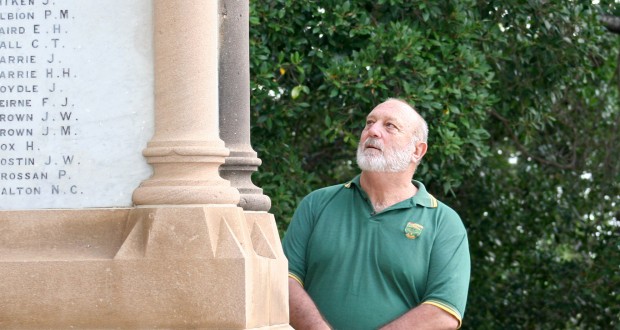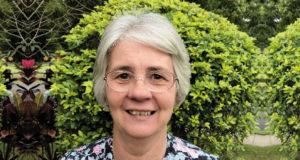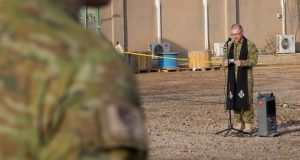This Anzac Day, remember those who continue to pay the price for serving their country. Dianne Jensen reports.
“I still don’t see the people we killed in ambushes and stuff; I don’t see our guys who were killed or wounded yet I was there. It is like being in a car accident but you don’t remember anything about it.”
Rev Jack Hammer is an Australian veteran of the Vietnam War, the conflict which divided the nation over 40 years ago and cost the lives of more than 500 Australian servicemen. A further 3000 were wounded, injured or debilitated.
Jack, now an Anglican priest, is one of an estimated 30 per cent of Vietnam vets who live with Post Traumatic Stress Disorder (PTSD). The disorder is associated with a range of mental health issues and elevated rates of substance abuse and suicide.
Jack served for two and a half years in Vietnam, arriving in South Vietnam in December 1967. He took part in the Tet Offensive, one of the largest military campaigns of the war, which was launched on 30 January 1968 by the Viet Cong and North Vietnamese Army.
“We were the first Australian troops to have ground attacks while we were in defended positions and that was up at a place called Anderson … So they are running across the paddock and you are in a dug-in position waiting for them to come,” says Jack.
The Vietnam War ended when Saigon fell to North Vietnamese forces in April 1975, two years after Australian troops were withdrawn.
In the decades which have followed, Australian Defence Force (ADF) personnel have served in combat operations and peacekeeping missions in areas as diverse as Iraq, Timor-Leste, Egypt, South Sudan and the Solomon Islands.
In December 2013 the last combat troops withdrew from Oruzgan Province in Afghanistan following nearly 12 years of conflict and 40 deaths. Another 260 ADF personnel were wounded.
The price of survival
As Jack Hammer and his mates know, the cost of war goes far beyond the official lists of killed and wounded and the budget reports. Many live with the trauma for the rest of their lives.
Janice Johnston is the Director of Psychology at Mates4Mates, a charity launched in 2013 by RSL Queensland Branch to provide a national off-base rehabilitation program for the wounded, injured and ill and their families.
She says that while PTSD can affect anyone in the community exposed to trauma, many medical practitioners are now referring to complex PTSD in relation to veterans and victims of long-term abuse.
“If you get held up on the way home from the shops, and this is the only time it ever happens, you could go on to develop PTSD. This is quite separate from somebody who experiences trauma over and over again on the battlefield where there is an amount and a severity of trauma which is different.
What we call complex PTSD comes packaged with other things … it might have depression, eating disorder, agoraphobia, anxiety or multiples of those wrapped up with it.”
Better understanding of the issue, which was previously described as shell shock or war neurosis during the first and second world wars, has helped to pinpoint the neurological issues.
“We know in modern research that PTSD actually rewires the brain so part of treating it well is getting the brain to make new connections that it has lost or that have been changed,” says Janice.
“Part of PTSD is that it comes after the event, and that could be six months later or for a Vietnam vet 30 years later. They may have had post-traumatic stress symptoms across that time; they might go through several marriages before somebody eventually says, you have PTSD and it has got to the point where it has become debilitating.”
On top of the volcano
Jack was one of those vets who thought that his recurring dreams, flashbacks, memory loss and the struggle to control his drinking were normal. It was only when he left the army after 22 years and became involved in setting up a veterans support group that he realised he was exhibiting symptoms of PTSD.
“When I saw my psychiatrist she asked me how I felt and I said it was like sitting on a volcano. You can feel anger in you all the time and what you are trying to do is put a cap on it. Some of the drugs they give you … will put a cap on it and that allows you to get on with life.”
He still wakes up at night, and has a “never-ending movie rolling in my head … you can see through it, it is just there”.
There is no turning-off the switch after a person is taught to go out and kill, says Jack.
“As I drive down the road I am looking at the bushes and the trees and the undergrowth and thinking, well I would put a machine gun there and I would mine that little gully over there in case they went there for cover. You do it automatically because that is how you lived and how you stayed alive.”
Caring for the wounded soul
Rev Rita Nakashima Brock, who founded the Soul Repair Center at Brite Divinity School in Texas, works with a concept US Veterans Affairs clinicians are describing as “moral injury”; a hidden wound which eats away at a person’s sense of self.
“Moral injury is a wound in the soul, an inner conflict based on a moral evaluation of having inflicted or witnessed harm,” she writes in an essay entitled “How do we repair the souls of those returning from Iraq?” on the Truth Commission on Conscience in War website.
“It results from a capacity for both empathy and self-reflection on moral values, which means it happens to healthy human beings. The current wars are especially morally compromising because the lines between innocent civilians and combatants are so blurred.”
Janice Johnston, whose role at Mates4Mates includes hands-on counselling, is aware that many veterans will struggle to take that crucial first step towards getting help.
“I use cancer as an analogy, so early intervention is the key. The problem is if someone is diagnosed with cancer it is okay to tell your friends and people will give you a lot of support … PTSD is a mental illness primarily so you don’t want to put your hand up and say you have it. By its very nature PTSD means that people are avoiders of things that are going to trigger it so they are also avoiders of getting help.”
Best practice treatment usually involves a combination of therapy with medication depending on symptoms, says Janice. Mates4Mates also provides mentoring, career coaching and family counselling as well as adventure challenge programs and other physical rehabilitation. The charity has grown an astonishing 600 per cent in its first year.
She agrees that while improved processes and better treatment will minimise the incidence of PTSD; “in the end there will always be a part that is just war itself”.
Regardless of our personal positions on a war, Rita Nakashima brock believes that understanding the real cost of sending young men and women to fight is the first step in a much longer societal healing process.
“A society that engaged in warfare must come to terms with its responsibilities for its effects and with its own moral injury.”
 JourneyOnline
JourneyOnline








Well said Jack.Your looking well.
Wally sent me this site keep up the good work.
Loved the reference to Anderson and your simple and true description.
Cheers